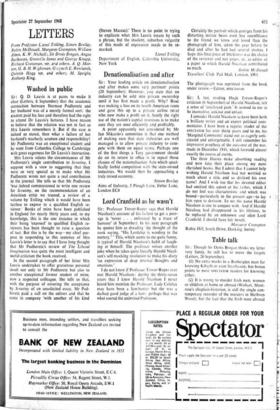Washed in public
LETTERS
From Professor Lionel Trilling, Simon Bewlay, Robin McDouall, Margaret Crompton, William Aiton, K. W. Nicholls, Sir Denis Brogan. Angus Buchanan, Grenvi:le Jones and George Knapp, Richard Grossman, MP, and others. A. Q. Mor- ton, G. B. H. W:ghtman, Gwyne:h E. Rowlands, Quintin Hogg MP. and other:, M. Speight, Anthony King.
Sir: Q. D. Leavis is at pains to make it clear (Letters, 6 September) that the academic connection between Norman Podhoretz and her husband was of a merely formal sort: the student paid his fees and therefore had the right to attend Dr Leavis's lectures.. I have reason to believe that the relation was not in fact as Mrs Leavis remembers it.. But if the case is indeed as stated, then what a failure of her husband's teacherly acumen and responsibility! Mr Podhoretz was an exceptional student and he went from Columbia College to Cambridge with great eagerness for Dr Leavis's instruction.
Mrs Leavis relates the circumstances of Mr Podhoretz's single contribution to Scrutiny, I suppose with a view to suggesting that they were so very special as to make what Mr Podhoretz wrote not quite a real contribution to the journal. She tells us that Mr Podhoretz 'was indeed commissioned to write one review for Scrutiny, on the recommendation of an American critic we trusted, a review of a volume by Trilling which it would have been tactless to expose to a qualified English re- viewer.' Books of mine have been published in England for nearly thirty years and, to my knowledge, this is the one instance in which their being 'exposed' to qualified English re- viewers has been thought to raise a question of tact. But this is by the way—my chief pur- pose in responding to this sentence of Mrs Leavis's letter is to say that I have long thought that Mr Podhoretz's review of The liberal imagination was quite the most intelligent and useful criticism the book received.
In the second paragraph of her letter Mrs Leavis undertakes to offer gratuitous personal insult not only to Mr Podhoretz but also to another exceptional former student of mine, now a respected colleague. She tells us that, with the purpose of ensuring the acceptance by Scrutiny of an unsolicited essay, Mr Pod- horetz paid a call on the editors and that he came in company 'with another of his kind
(Steven Marcus).' There is no point in trying to explicate what Mrs Leavis means by such a phrase, but the insolent, suburban vulgarity of this mode of expression needs to be re- marked.
Lionel Trilling Department of English, Columbia University, New York










































 Previous page
Previous page